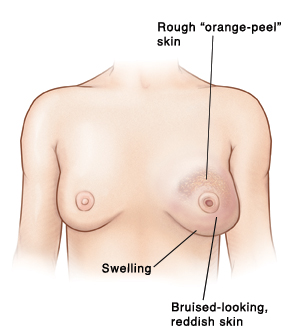Inflammatory Breast Cancer
Your doctor suspects that you have inflammatory breast cancer (IBC). IBC is a rare type of breast cancer (when cells in the breast grow abnormally). It is very aggressive (fast-growing) and can be hard to detect. When it is detected, treatment starts right away. This sheet tells you more about IBC and how it is treated.
How IBC Is Different from Other Breast Cancers

Unlike the symptoms of other breast cancers, IBC's most prominent symptoms are changes in the skin of the breast.
Symptoms of IBC are different from those of other breast cancers. The main differences are:
-
Breast cancer cells typically form a lump. But with IBC, lumps are rare. As a result, the cancer may not be noticed during a breast exam or on a routine mammogram. This makes diagnosis harder than with other breast cancers.
-
IBC cells block vessels in the skin called lymph vessels (part of the immune system). This causes swelling and warmth in the breast. These symptoms can look and feel like infection or inflammation (mastitis). This can also make diagnosis of IBC more difficult.
-
IBC grows more quickly than other breast cancers.
Because of these differences, IBC is often advanced by the time it is diagnosed. As a result, it can be harder to treat than other breast cancers.
Symptoms of IBC
IBC symptoms develop quickly, often over a few weeks or months. Symptoms can include:
-
Sudden swelling of the breast
-
Warmth in the breast
-
A red, pink, reddish-purple, or bruised appearance
-
Skin that has ridges or appears pitted, like the peel of an orange
-
Itching of the breast or nipple
-
An inverted nipple
-
Swollen lymph nodes under the arm and/or above the collarbone
-
Breast pain
Diagnosis and Staging
IBC is most often diagnosed with a physical exam by your doctor. Certain tests will also be done. These confirm a diagnosis and help with staging. With staging, the cancer is classified according to how much and where it has spread. Staging helps the doctors plan treatment. IBC is classified as either stage III or stage IV breast cancer. This is because it's usually advanced by the time it's found. For more information on staging, visit www.cancer.gov/cancertopics/wyntk/breast/page9.
Tests that may be done include:
-
Mammogram. This type of x-ray creates pictures of the inside of the breast.
-
Ultrasound. This test uses sound waves to create images of the inside of the breast.
-
CT (computed tomography) or MRI (magnetic resonance imaging). These imaging tests create images of the inside of the breast. A CT uses x-rays. An MRI uses magnets and radio waves.
-
Biopsy. A tissue sample is removed. The sample is sent to a lab and checked for cancer. There are several types of breast biopsy. These include fine needle aspiration and large-core biopsy. Your doctor will explain the type that you will have.
-
Bone scan. This test helps check if cancer has spread to the bones. A safe radioactive material (tracer) is sent through the bloodstream. A scan of the body is then done to see how much tracer collects in the bones.
Treatment of IBC
Once IBC is diagnosed and staged, treatment begins right away. Cancer is treated using different methods. For other breast cancers, surgery is typically done first. But with IBC, treatment starts with chemotherapy.
-
Chemotherapy. This treatment uses certain medications given through a vein to attack the growth of cancer cells. You will likely receive at least two different kinds of medication.
-
Surgery. This is done if the cancer has not spread too far. A modified radical mastectomy is most often done. This means the entire breast and the lymph nodes under the arm are removed.
-
Radiation. This treatment targets x-rays on the chest area to destroy remaining cancer cells.
After these steps, you may have additional treatments. They may include more chemotherapy, as well as:
-
Hormonal therapy. Medications are used to prevent certain hormones your body makes from helping cancer cells grow.
-
Targeted therapy. Medications are used to block growth of cancer cells.
-
Supportive care. This is care that helps improve the quality of life of patients. For instance, it may help ease disease symptoms or side effects of treatments. It can also involve support to help patients cope with the emotional and mental strain of having cancer.
Your Prognosis
Prognosis means the likely outcome of the disease. Because IBC is so fast-growing and often hard to detect, it is more dangerous than other types of breast cancer. The 5-year survival rate is not as good as for other breast cancers. But it's important to consider that this rate is based on general numbers covering a large number of cases. Your situation is unique. Talk to your doctor about your individual condition.
Clinical Trials
If you are interested, talk to your doctor about taking part in a clinical trial. Clinical trials are ways to test new treatments before they're made available to the public. Because IBC is so rare, it's hard for researchers to find enough patients to study. So, the National Cancer Institute encourages patients with IBC to take part in clinical trials. For more information on clinical trials, visit www.cancer.gov/clinicaltrials.

